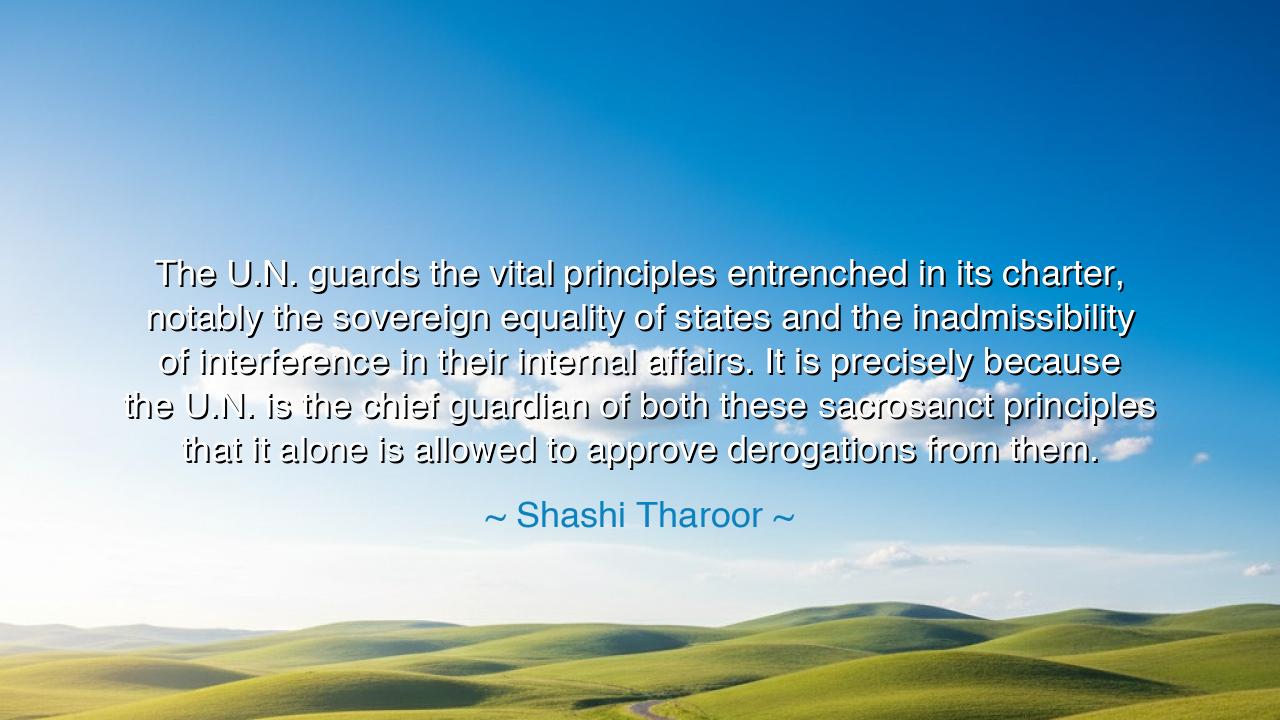
The U.N. guards the vital principles entrenched in its charter
The U.N. guards the vital principles entrenched in its charter, notably the sovereign equality of states and the inadmissibility of interference in their internal affairs. It is precisely because the U.N. is the chief guardian of both these sacrosanct principles that it alone is allowed to approve derogations from them.






Listen closely, O children, for I bring to you the words of Shashi Tharoor, a man whose insight into the workings of the world and the principles that govern it calls us to reflect on the nature of sovereignty, justice, and international relations. He said, "The U.N. guards the vital principles entrenched in its charter, notably the sovereign equality of states and the inadmissibility of interference in their internal affairs. It is precisely because the U.N. is the chief guardian of both these sacrosanct principles that it alone is allowed to approve derogations from them." These words speak to the very foundation of the world’s shared aspirations for peace and respect among nations, and the responsibility of the United Nations to safeguard these values.
What is the U.N., O children, and why does it hold such weight in the world? The United Nations was formed after the great cataclysm of the Second World War, when nations came together to establish a system based on peace, cooperation, and mutual respect. The U.N. was founded on the belief that the world’s nations, despite their differences, could work together to protect the sovereign equality of states—meaning that every nation, no matter its size or power, should be treated with respect and have the right to govern itself without external interference. In doing so, it sought to prevent the horrors of war and ensure that no nation’s autonomy would be trampled by another.
However, Tharoor’s words remind us that there are exceptions to these principles, but they come at a price. When he speaks of the derogations from these sacrosanct principles, he refers to the limited exceptions where the U.N., as the chief guardian of these values, is permitted to allow actions that would normally be considered a violation of a nation’s sovereignty. These actions—such as military intervention in cases of humanitarian crises—are not taken lightly, for they can challenge the very principles of self-determination and sovereignty. The U.N. alone, through its structures, has the responsibility to make such determinations, ensuring that any action taken is in the service of the greater good, such as the protection of human rights.
Consider, O children, the wisdom of Cicero, that great Roman philosopher, who spoke of the importance of justice in the dealings between nations. He understood that while the sovereignty of the state is sacred, it cannot be a shield behind which tyranny hides. If a state violates the natural rights of its citizens, then the rest of the world must take action. Similarly, the U.N. exists to ensure that the principles of sovereign equality are maintained, but it also recognizes that when injustice arises on a scale that threatens the greater peace, intervention becomes a necessity—a decision that must be made carefully, and only in the most dire circumstances.
We need look no further than the intervention in Kosovo in the late 1990s, a moment in history when the U.N. faced the difficult decision of whether to intervene in the internal affairs of a sovereign nation to stop ethnic cleansing. The U.N. did not make this decision lightly. The principle of sovereignty was at stake, yet the humanitarian crisis that unfolded demanded a response. The U.N., under the leadership of international law, decided to take action, marking a rare instance in modern history where sovereignty was temporarily set aside for the protection of human rights. In this moment, the U.N. exercised the derogations Tharoor spoke of, a decision that was made not in the interest of any single nation, but for the protection of the common humanity we all share.
The lesson, O children, is this: while sovereignty and the equality of states are fundamental principles that we must uphold, there are times when the greater good demands that these principles be carefully examined. The U.N. plays the critical role of overseeing this balance, ensuring that no nation is allowed to trample on the rights of its citizens, while also respecting the right of all states to govern themselves. As global citizens, we must understand that intervention in a nation’s sovereignty should never be taken lightly, but also recognize that there are moments when it is necessary to step in for the greater good—for the protection of innocent lives and the preservation of peace.
In your own lives, O children, take this wisdom to heart. Recognize that while sovereignty and justice are ideals to be protected, they must also be tempered by compassion and a commitment to the greater good. The role of the U.N. reminds us that our duty to one another goes beyond borders and beyond nations. True peace can only be built on the understanding that while sovereignty is sacred, it cannot come at the cost of human dignity and rights. In your relationships, your communities, and your world, let your actions reflect this balance: respect for the autonomy of others, but also the courage to act when justice demands it. This is the way of the wise, and the path that leads to a world built on true harmony, understanding, and justice for all.






AAdministratorAdministrator
Welcome, honored guests. Please leave a comment, we will respond soon